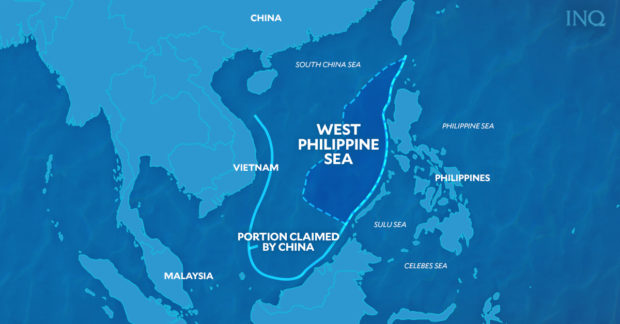
Two Chinese Navy ships were observed watching while US and Philippine troops conducted joint patrols in the West Philippine Sea last Friday, February 9, Navy spokesperson for the West Philippine Sea Commodore Roy Vincent Trinidad reveals during a press conference at Camp Aguinaldo, Quezon City, on Tuesday, February 13, 2024. INQUIRER FILES
MANILA, Philippines — The Philippine Navy observed the presence of two Chinese Navy vessels while US and Philippine troops conducted joint patrols in the West Philippine Sea last Friday.
Navy spokesperson for the West Philippine Sea Commodore Roy Vincent Trinidad said Tuesday that the two People’s Liberation Army (PLA)-Navy ships appeared to be monitoring the latest maritime cooperative activity (MCA) between Manila and Washington.
READ: US, PH conduct 3rd joint patrol in West PH Sea
“There [was] the presence of two PLA-Navy ships [on] the horizon,” Trinidad disclosed during a press briefing at Camp Aguinaldo, Quezon City.
Aside from the two Chinese vessels, there were no other “uninvited guests” during the US-Philippines military exercise, he added.
“[As for] uninvited guests, no maritime militia, no [Chinese] coast guard vessels were monitored.”
Trinidad did not further elaborate on the type of Chinese warship present in the area last Friday.
The second US-PH MCA was conducted last month while the first-ever joint patrol was held in November 2023, according to the Armed Forces of the Philippines (AFP).
The previous joint patrols of Manila and Washington also saw the presence of Chinese vessels and aircraft.
In November 2023, a Chinese Navy guided-missile frigate and a surveillance plane kept watch on the joint maritime patrol.
READ: China keeps watch on PH-US sea patrols
As a US Navy Poseidon P-8A surveillance aircraft flew overhead while the Philippine Navy’s BRP Conrado Yap (PS-39) sailed with the US Navy’s USS Gabrielle Giffords for a passing exercise, the PLA-Navy Jiangkai-II frigate and a Shaanxi Y-9 surveillance aircraft operated in the vicinity, as witnessed by INQUIRER.net and a few other Filipino journalists who were invited to observe the activity.
There were no aggressive interactions from both sides, although the Jiangkai-II frigate came as close as 9.26 kilometers (5 nautical miles) from the USS Giffords.
Lt. Cmdr. Tim Cline, mission commander of the US Navy P-8A maritime patrol aircraft said at that time that: “Nothing unusual. Both parties… conducted themselves safely and professionally and normally, which is what we’re always out here trying to do.”
“The objective [of our operations here] is to normalize activity and normalize interactions with each other,” he added.
READ: PH-US drills off Mindoro ‘shadowed,’ shortened
On January 3, a Jiangkai-class Chinese frigate and a Chinese Luoyang-class destroyer also shadowed the second MCA of Manila and Washington in the West Philippine Sea.
These PLA-Navy warships appeared while BRP Gregorio del Pilar, BRP Davao del Sur (LD-602), and BRP Ramon Alcaraz (PS-16), along with US Navy destroyer USS Sterett (DDG- 104) were conducting their patrols.
The BRP Gregorio del Pilar and the PLA-Navy’s Jiangkai-class Chinese frigate exchanged radio challenges, but no other untoward incidents occurred during that time.
Beijing’ actions are in line with its assertion of sovereignty over almost the entire South China Sea, including most of the western section of Manila’s exclusive economic zone (EEZ). An international tribunal ruling in 2016, however, effectively dismissed this sweeping claim.
According to Article 57 of the United Nations Convention on the Law of the Sea, a country has sovereign rights over its own EEZ, but other nations could still enjoy non-economic uses in other states’ EEZ such as freedom of navigation as well as the right of overflight.


